人教版 初二英语上Unit 4 How do you get to school 试题 2
- 格式:doc
- 大小:49.00 KB
- 文档页数:7
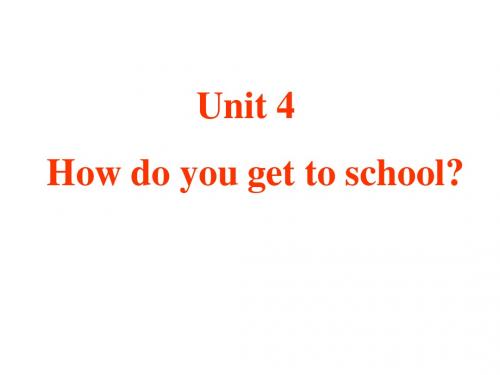

新课标人教版初中英语八年级上册《Unit 4 How do you get to school?》精品教案Section B (3a-4)【教学目标】知识目标:1. Words and expressions: North America, part, depend on, river, by boat, must, more,than, means, car…2. Read the article : How do students around the world get to school ?能力目标:能用目标语言了解和谈论自己及其他国家学生如何去上学,并学会写newspaper article情感目标:通过活动,激发兴趣,提高参与意识,分享活动成果。
通过学习,让学生了解生活,开阔视野,从而更加热爱学校生活,科学合理地安排学习和生活。
【重点和难点】重点:掌握所学的单词及培养学生的阅读能力。
难点:如何熟练运用目标语言谈论和调查自己及其他国家学生怎样去上学,并学会写newspaper article 。
【学习过程】Step 1 Warming up1. Task 1 Talk about how to get to school .参考句型:A: How do you get to school ?B: I take the bus /…A: How far do you live from school ?B:I live …kilometers from school .. A: How long does it take ?B: It takes about…minutes .2、3、4、5、2、Task 2 Read the article according to the new words on P23 and do the exercises below .At North Yi Nan School, students get to school in different ways every day . Most students take the bus because they live far from school. Some students ride their bikes becausethey like riding bikes very much. Other students walk to school. A small number of students take a boat to school because they live near the river . That must be a lot more fun than taking a bus . In other parts of Yi Nan , maybe things are different .⑴、在文中找出go to school by boat 的同义短语:⑵、用a small number of 造句:⑶、in other parts of Yi Nan (译成汉语):⑷、That must be a lot more fun than taking a bus .(译成汉语):Step 2 While-reading教师寄语: A man’s fate depends on himself .人的命运掌握在自己的手里。

八年级英语上册Unit4Howdoyougettoschool人教新目标版初二英语上册Unit 4 How do you get to school? 人教新目标版一、学习目标:1、知识目标:掌握本讲的词汇、短语和句型。
2、能力目标:学会用英语谈论交通工具。
3、情感目标:合理安排行程,并合理选用交通工具。
二、重点、难点:重点:单词take, worry;短语get to, depend on, a number of;句型What do you think of…? How far is it?难点:乘坐交通工具的正确表达。
三、知能提升(一)重点单词[单词学习]◎take【用法】固定句型It takes sb. some time to do sth. 意为:“花费某人多长时间做某事”。
it是形式主语,不定式to do sth.是真正的主语。
对some time 提问时,用how long。
【例句】It took me ten minutes to find the book.【考查点】辨析:cost, take, pay 和spendcost意为“花费(钱)”,主语一般是表示所买东西的名词。
如:This watch costs me eight dollars.pay 作“花费,付”解,只用于钱,用“人”作主语,后跟“钱”作宾语。
常以pay…for 形式出现。
如:I paid 120 dollars for this camera.spend作“花费”解时,常用于时间和钱。
主语常常是“人”。
它有spend…on…和spend…(in)doing两种形式,spend…on…常用于花钱,spend…(in)doing常用于花时间。
如:I spent 60 dollars on the recorder.He spent two hours (in) reading the novel.【易错点】没有识记结构【考题链接】1. It Mike twenty minutes to walk to school every day.A. spendsB. paysC. takes答案:C解题思路:本题考查“花费”的动词辨析。
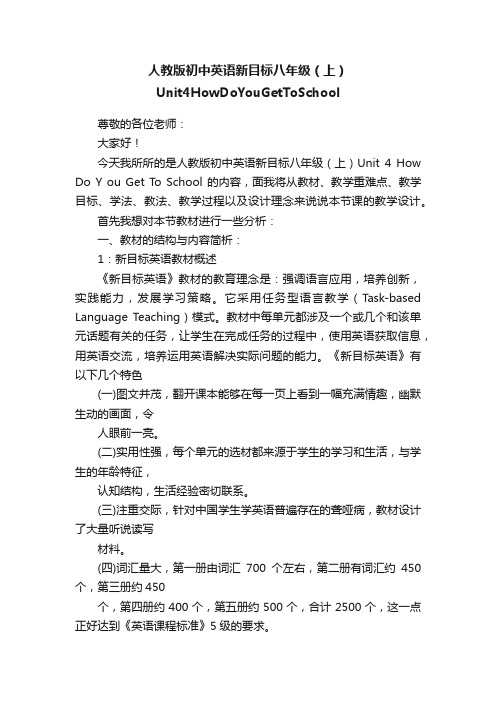
人教版初中英语新目标八年级(上)Unit4HowDoYouGetToSchool尊敬的各位老师:大家好!今天我所所的是人教版初中英语新目标八年级(上)Unit 4 How Do Y ou Get T o School 的内容,面我将从教材、教学重难点、教学目标、学法、教法、教学过程以及设计理念来说说本节课的教学设计。
首先我想对本节教材进行一些分析:一、教材的结构与内容简析:1:新目标英语教材概述《新目标英语》教材的教育理念是:强调语言应用,培养创新,实践能力,发展学习策略。
它采用任务型语言教学(Task-based Language Teaching)模式。
教材中每单元都涉及一个或几个和该单元话题有关的任务,让学生在完成任务的过程中,使用英语获取信息,用英语交流,培养运用英语解决实际问题的能力。
《新目标英语》有以下几个特色(一)图文并茂,翻开课本能够在每一页上看到一幅充满情趣,幽默生动的画面,令人眼前一亮。
(二)实用性强,每个单元的选材都来源于学生的学习和生活,与学生的年龄特征,认知结构,生活经验密切联系。
(三)注重交际,针对中国学生学英语普遍存在的聋哑病,教材设计了大量听说读写材料。
(四)词汇量大,第一册由词汇700个左右,第二册有词汇约450个,第三册约450个,第四册约400个,第五册约500个,合计2500个,这一点正好达到《英语课程标准》5级的要求。
2:单元分析以及教材处理本节内容在全书及单元的地位:本节课的内容属于初中英语新目标八年级(上)第四单元Section A的内容,其中心话题是学习用How do you go to school为话题,围绕traffic way 展开,运用一般现在时谈论如何上学并且扩展到谈论如何到达其他地方。
它与上一课What are you doing for vacation 能够有机的联系起来。
本课时的学习是能够使学生更加灵活掌握在各种人称下How 问句的用法,以及各种交通工具词汇的掌握和使用。
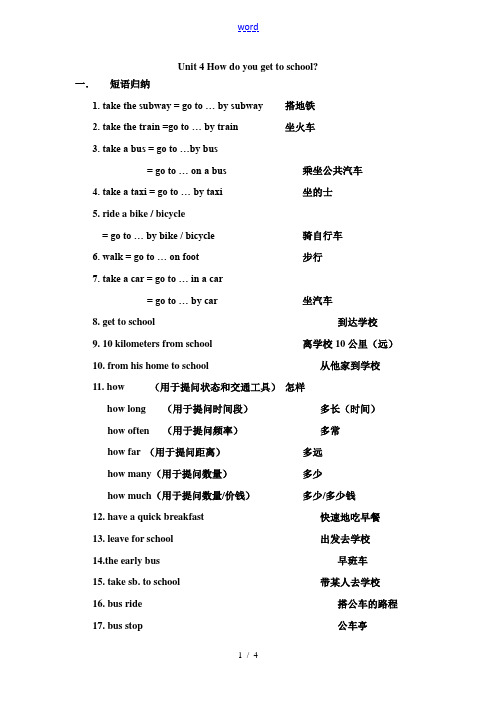
Unit 4 How do you get to school?一.短语归纳1. take the subway = go to … by subway 搭地铁2. take the train =go to … by train 坐火车3. take a bus = go to …by bus= go to … on a bus 乘坐公共汽车4. take a taxi = go to … by taxi 坐的士5. ride a bike / bicycle= go to … by bike / bicycle骑自行车6. walk = go to … on foot 步行7. take a car = go to … in a car= go to … by car 坐汽车8. get to school 到达学校9. 10 kilometers from school 离学校10公里(远)10. from his home to school 从他家到学校11. how (用于提问状态和交通工具)怎样how long (用于提问时间段)多长(时间)how often (用于提问频率)多常how far (用于提问距离)多远how many(用于提问数量)多少how much(用于提问数量/价钱)多少/多少钱12. have a quick breakfast 快速地吃早餐13. leave for school 出发去学校14.the early bus 早班车15. take sb. to school 带某人去学校16. bus ride 搭公车的路程17. bus stop 公车亭18. bus station 公车站19.train station 火车站20.subway station 地铁站21.think of 认为22.around the world=all over the world 遍及全世界23. in North America 在北美洲24.on the school bus 乘/坐校车25.in other parts of the world 在世界上的其他地方26.the other (两者中的)另一个27. others = other (students) 其他的(学生)28.things are different 情况不同29.be different from 与…不同be the same as 与…一样30.make a difference 产生差异31.depend on 取决于/依赖/依靠32. go to school by boat = take a boat to school 坐船去上学33.must be 肯定/一定是34. the most popular ways 最流行的方式means of transportation 交通方式35.a small number of 小部分的36. a large / great number of 大多数的37. ill in the hospital 生病住院38. worry about sb. /sth. 担心某人/某事二.固定结构1.It takes / took (sb.) some time to do sth.做某事花了某人…时间/ 某人花了…时间做某事It takes me 20 minutes to finish all my homework.我花了20分钟的时间完成了所有的作业。

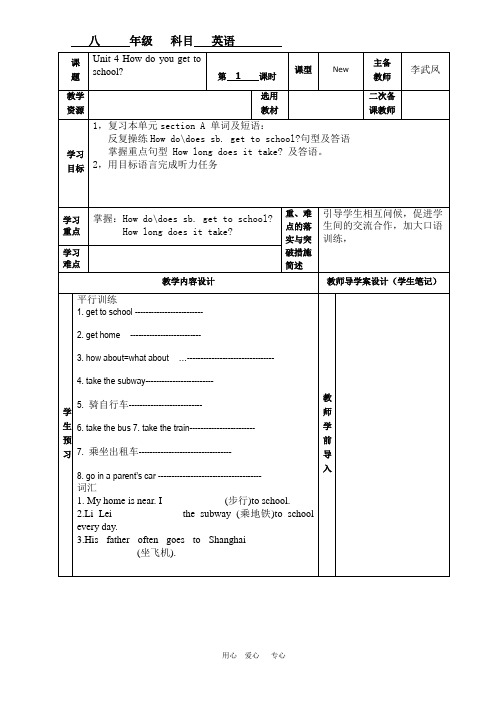

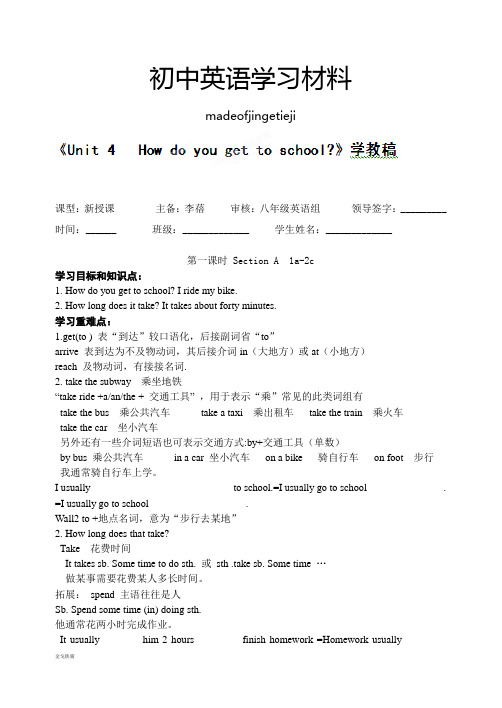
初中英语学习材料madeofjingetieji课型:新授课主备:李蓓审核:八年级英语组领导签字:_________ 时间:______ 班级:_____________ 学生姓名:_____________第一课时 Section A 1a-2c学习目标和知识点:1. How do you get to school? I ride my bike.2. How long does it take? It takes about forty minutes.学习重难点:1.get(to ) 表“到达”较口语化,后接副词省“to”arrive 表到达为不及物动词,其后接介词in(大地方)或at(小地方)reach 及物动词,有接接名词.2. take the subway 乘坐地铁“take ride +a/an/the + 交通工具”,用于表示“乘”常见的此类词组有take the bus 乘公共汽车take a taxi 乘出租车take the train 乘火车take the car 坐小汽车另外还有一些介词短语也可表示交通方式:by+交通工具(单数)by bus 乘公共汽车in a car 坐小汽车on a bike 骑自行车on foot 步行我通常骑自行车上学。
I usually __________ ________ ________ to school.=I usually go to school _________ _____. =I usually go to school _________ _________.Wall2 to +地点名词,意为“步行去某地”2. How long does that take?Take 花费时间It takes sb. Some time to do sth. 或sth .take sb. Some time …做某事需要花费某人多长时间。

Unit 4 How do you get to school? 课堂教学设计Section A Period 1 (1a——2d and Grammar Focus)一.教材分析Unit4的主要话题是“transportation”,它与我们学生的日常生活紧密联系,生活离不开“行”,因此本单元就是学习描述人们日常出行的主要方式,学习一般现在时,一个生活中离不开的时态。
Section A第一课时:以听说为主,利用多媒体感受语言,通过听和看图来确定或描述人物的出行方式,教材以How do you get to school?为中心话题,围绕“traffic way”展开,运用一般现在时。
Section A与学生的实际密切相关,易于引发学生用英语进行交际交流,完成听说读写的任务活动,重点掌握和熟练应用How do you get to school? How long does it take? 及其答语等句型。
二.教学目标1.语言知识目标掌握有关交通的词汇,如take the subway/train, ride the bicycle, go by bus/boat/plane, go on foot, transportation, bus stop, train station,kilometer, mile, river 以及其它一些词汇。
掌握由How引导的特殊疑问句及其答句:How do you get to school? I ride my bike.How long does it take?It takes about forty minutes.2.语言技能目标学会谈论交通工具;学会恰当安排行程,并合理选用交通工具。
3.情感态度目标让学生感受到他们学习英语是为了在现实生活中进行交流,而不单纯是为了英语课和应付考试而学习,了解东西方国家出行方式的不同,以及不同的交通规则,教育学生注意交通安全, 加深对交通知识的了解。
Unit 4 How do you get to school?一、短语翻译(10分)1、到达6、a small number of2、四十分钟7、take the subway3、校车8、the bus stop4、决定于9、six miles5、别担心10、take a subway二、语法选择(25)( )1、That book _____ Tracy 10 dollars.A. takesB. costsC. spends( )2、"How can you get from Italy to Brazil?" "_______."A. Can flyB. By airC. By a plane( )3、"How long does it ______ you to walk to the cinema?" " Twenty minutes."A. useB. usesC. take( )4、"_____ is it from your home to school? " Twenty minutes' walk."A. How longB. How farC. How( )5、Taking a boat to school ______ a lot more fun than taking a bus.A. must haveB. must be haveC. must be( )6、"Please wait _____ the bus stop until I come back." The mother told the children.A. forB. inC. at( )7、Thomas wants to know _______.A. where Nina livesB. where does Nina liveC. Nina lives where ( )8、Laura's home is 10 kilometers _____ the school.A. farB. far fromC. away from( )9、In my school, _____ students go to school on a school bus.A. a small number ofB. muchC. a lot( )10、Good health ______ good food, exercise, and getting enough sleep.A. depend onB. depend byC. depends on( )11、Timmy goes to school _____ every day.A. in a busB. by planeC. on foot( )12、Let's go there _____ our bikes.A. inB. byC. on( )13、The cake is delicious. May I have ___?A. the otherB. otherC. another one( )14、The lake is different ___ the river.A. inB. fromC. with( )15、--_____football? __It's a very popular game in China.A. What do you likeB. How do you think ofC. What do you think of( )16、--How do you usually come to school?-- ____ car.A. ByB. By aC. In( )17、She often goes to school on her bike. but sometimes she ____.A. walkB. is walkingC. walks.( )18、Is the bus station far _____ your home?A. fromB. toC. of( )19、It takes ___ thirty minutes to get to school by bike.A. myB. meC. I( )20、--How do you get to school, Han Mei? -- _____.A. By footB. On footC. On feet( )21、_____ do you get to school, Emma? I take a train.A. WhatB. WhenC. How( )22、Mary ____ her bike to school every day.A. takesB. ridesC. starts( )23、____ does it take you to get from home to school? Thirty minutes.A. How longB. How manyC. How much( )24、How do the students ____ the world get to school?A. onB. aroundC. about( )25、In North America, most students go to school ____ the school bus.A. onB. byC. in三、完型填空(10分)1、What do you do at the weekend? Some people like to (1 ) but otherslike to go out for (2) or to play soccer. My friend Jack works hard in a factory during the (3). At the weekend, he always does the (4) thing. On Saturday he (5) his car and on Sunday he goes with his family to a village by (6 ). His uncle and aunt have a farm(7). It isn't a big (8), but there is always much to do on it. The children help to give the animals their (9). Jack and his wife help in the fields. At the end of the day, they' re all (10) and Jack's aunt gives them a big meal.( )01. A. go to work B. stay at home C. go hiking D. see friends ( )02 A. a walk B. shop C. school D. something ( )03 A. day B. year C. holiday D. week ( )04 A. good B. hard C. same D. different ( )05 A. drives B. mends C. washes D. takes ( )06 A. car B. bus C. train D. bike ( )07 A. too B. here C. there D. near ( )08 A. that B. this C. it D. one( )09 A. water B. food C. houses D. vegetables( )10 A. happy B. thirsty C. tired D. hungry四、阅读理解(10分)1、A mother and her young son got into a bus in a small city and sat down. The bus conductor came to them for their money. The mother said, "I want one ticket to Oxford, "and gave her a shilling(先令). The conductor looked at the small boy for a few seconds and then said to him, "How old are you, young man?" The mother began speaking, but the conductor stopped her, and the boy said, "I'm four years old at home, and two and a half in buses and trains." The mother took six pence(便士) out of her bag and gave the money to the conductor. The conductor gave her one and a half tickets. ( )l. One day the mother took a bus ______.A. to a small cityB. to get some moneyC. with her son ( )2. The mother gave the conductor_____ pence in all(总共) that day.A. l2B. l6C. l8( )3. The mother was______.A. not honest(诚实)B. honestC. very clever( )4. The conductor asked ______ how old he was.A. the motherB. the little boyC. the bus driver( )5. The boy was ____ years old then.A. fourB. twoC. two and a half五、句型转换(10分)1、A. John usually walks to school.(同义)B. John usually _____ to school _________ ________.2、A. I usually take the bus to school(同义)B. I usually _______ to school _______ bus.3、It is four miles from my home to school.(提问)____ ____ is it from my home to school?4、It takes me twenty-five minutes to get from home to school.(提问)______ _____ _____it _____ to get from home to school?5、Did you take a train to Beijing?(同义)Did you go to Beijing____ _____?六、句子翻译(10分)1、我该乘哪路车?这取决于你在哪里。